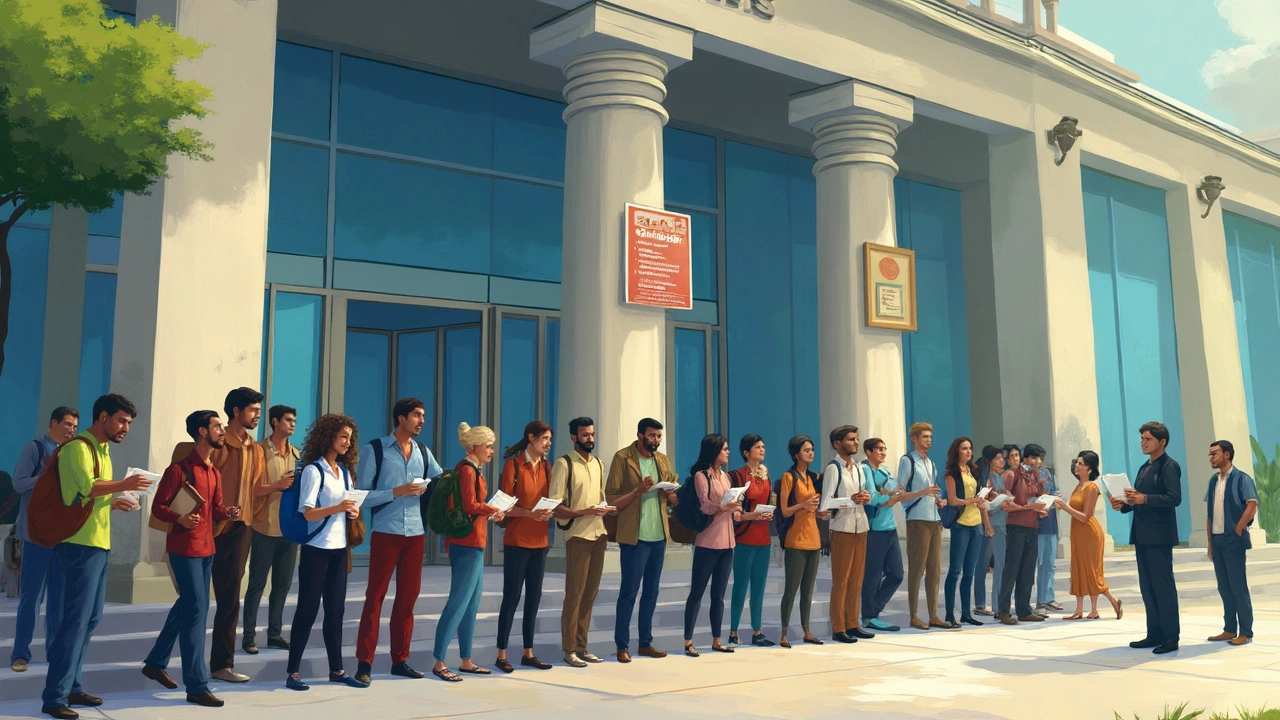May
29

- by Dhruv Ainsley
- 0 Comments
Landing a federal job isn’t just about ticking boxes on a form—lots of folks trip up before they even get to the interview. One wrong move in your application, and it's game over. You’d be shocked how many candidates get rejected just for leaving blanks, mixing up dates, or missing key requirements. Federal human resources don’t mess around—they will scan every line for a slip-up. There’s no mercy for careless mistakes, even if you’re a perfect fit otherwise.
Worried about what could disqualify you before you start? This stuff matters way more than you’d think. Agencies dig deep into your background, so anything from an old criminal charge to unpaid student loans can flag you. It’s not just about having a degree; it’s about being squeaky clean—on paper and in person. So before you even apply, get your ducks in a row and check every detail. You’ve only got one shot to make a federal first impression.
- Application Mistakes That Actually Matter
- Background Checks and Security Clearances
- Eligibility Rules You Can’t Ignore
- Tips to Avoid the Major Pitfalls
Application Mistakes That Actually Matter
You’d think the hardest part of getting a federal job is qualifying, but honestly, most folks get tripped up way before that. Even tiny errors in your application can send yours straight to the rejection pile. Agencies don’t cut slack for missing info or sloppy paperwork. In 2023, the federal government tossed out over 30% of applications for easily avoidable blunders, according to the U.S. Office of Personnel Management.
If you want a fighting chance, here are big mistakes that instantly ruin your shot:
- Missing Fields: Leaving any box empty (even your middle initial or former addresses) can get your application bounced right away.
- Wrong Dates and Work History: Gaps, inconsistencies, or incorrect dates will raise red flags, even if it’s an innocent typo. Most hiring systems scan for these mismatches automatically.
- Forgetting to Attach Documents: If the job asks for transcripts, certifications, or proof of veteran status and you skip one, you’re done. No one will chase you for the missing piece.
- Using the Wrong Resume Format: Federal resumes are not like standard business resumes. They want a lot more info (detailed job descriptions, month/year format, supervisor names, and contact info). Skipping these details? You’re sunk.
- Not Tailoring Your Application: Submitting a generic resume instead of customizing it for the specific position is a rookie move. The application must match the job’s “required qualifications” word for word. Automated systems will weed you out if they don’t match up.
Here’s a quick look at the most common reasons federal applications get tossed:
| Mistake | % of Rejected Applications (2023) |
|---|---|
| Incomplete Application | 22% |
| Wrong/Unformatted Resume | 17% |
| Missing Documents | 12% |
| Inaccurate Work History | 8% |
| Unqualified (per announcement) | 33% |
It sounds harsh, but most hiring managers only spend a couple minutes looking at each application. If things don’t line up, your shot is over before you even start. Double-check every box, upload every document they ask for, and make sure your resume matches what’s in the announcement. It’s tedious, but miss one thing, and you’ll never know why you didn’t get a call back.
Background Checks and Security Clearances
If you’re gunning for a federal job, expect the government to do some serious digging into your life. The process is tough—think way beyond a standard job check. Agencies want to know if they can trust you with confidential stuff and public money. For lots of federal roles, especially anything tied to defense, security, or finance, you’ll go through a full background check and might need a security clearance.
Here’s what they typically check:
- Your criminal history—arrests, charges, convictions. Even arrests that didn’t lead to charges can raise questions if you don’t talk about them.
- Credit reports—unpaid bills or big debt make you look risky, especially for finance or law enforcement jobs.
- Drug and alcohol use—recent history is a big red flag. The feds often test for usage, even if it’s legal in your state.
- Employment history—they’ll talk to past employers and check your resume for lies or gaps.
- Foreign contacts—lots of close connections with people in other countries can make clearance tricky.
Security clearances come in three main flavors: Confidential, Secret, and Top Secret. The deeper you go, the more questions they’ll ask, and the longer it takes—sometimes up to a year for Top Secret clearance. The chart below gives you a quick look at how long it usually takes to process each level:
| Clearance Level | Average Processing Time |
|---|---|
| Confidential | 1-3 months |
| Secret | 2-4 months |
| Top Secret | 6-12 months |
A failed background check is one of the top reasons people get knocked out of the running. Hiding past arrests, lying on forms, or leaving out details are huge mistakes. The Feds expect full honesty, even about messy old stuff. If you’re up front, chances are better than you think—sometimes even a past mistake won’t ruin your shot if you’re honest from the start.
One more tip: if you’ve got foreign connections or debts, think about clearing those up or being ready to explain them. Investigators pay extra attention to these. A steady, trouble-free recent history makes you stand out for the right reasons.

Eligibility Rules You Can’t Ignore
Even the smartest candidates get tripped up by rules that sound simple but turn out to be deal-breakers. Federal agencies stick to clear, set laws for who gets considered in the first place. Some of these rules come straight from Congress, not just the hiring manager’s checklist, so there’s no bending.
First off, you’ve got to be a U.S. citizen for most federal jobs. There are rare exceptions, but don’t count on them. Veterans get a real edge through special hiring paths—if you served, your military paperwork needs to be spotless and up to date. Age can also block you from jobs in law enforcement or air traffic control, since they cap hiring at specific ages (like 37 for most law enforcement roles), unless you’ve racked up enough creditable service already.
- Citizenship: Proof required, no shortcuts.
- Selective Service: Male applicants born after 1959 must show they registered (even if you never served).
- Background: Some roles want you to pass a security clearance, and messy finances or certain criminal convictions can instantly knock you out.
- Education/Experience: The job posting will spell out exactly what degree, training, or work history you need, and missing even one thing shuts the door, no questions asked.
Hiring managers don’t guess—they use hard rules. If you’re not eligible, the system screens you out before a human ever checks your resume.
| Requirement | Must Have? | Notes |
|---|---|---|
| U.S. Citizenship | Yes (for most jobs) | Some exceptions exist, but rare |
| Selective Service | Yes (males born after 1959) | Proof is part of hiring file |
| Age Limit | Varies by job | Common for law enforcement/ATC |
| Security Clearance | Depends on role | Trigger for extra background checks |
| Degree/Experience | Yes | Matched to job listing—no exceptions |
Here’s the thing: these aren’t just for show. In 2023, almost 22% of federal job applicants got filtered out at stage one just for missing basic eligibility. It’s a bummer to waste months on paperwork and never get a shot, so double-check the basics before you go any further. Missing out on a federal job because of a technicality hurts more than a tough interview.
Tips to Avoid the Major Pitfalls
Here’s the deal: getting tripped up during the federal job process is common, but most of those traps are avoidable if you pay attention. Let’s break down the best ways to sidestep the big mistakes.
- Federal job applications are super detailed. Double-check every section before hitting submit. A missing document or a date you can’t back up can toss your application aside in seconds.
- Use the official USAJOBS.gov site for everything. Don't trust random job boards. Agencies post directly there, and you’ll get the freshest instructions straight from the source.
- Make sure you meet every “required qualification” in the job listing before you even start. If it says two years of specific experience, don’t round up or fudge the numbers—they will spot it during review.
- Be 100% honest in the background and security clearance forms. Even tiny “white lies” about past employment or schooling have led to disqualification.
- Look out for financial flags. According to the U.S. Office of Personnel Management, over 11% of security clearance rejections in 2023 were due to financial issues like unpaid debts or bankruptcy.
- If you’ve got anything questionable in your history (like minor legal charges, bad credit, or gaps in employment), explain it upfront in the designated application sections. Agencies actually appreciate clarity and context.
Check out some common reasons applicants got held up last year, straight from OPM stats:
| Disqualification Reason | Percentage of Applicants |
|---|---|
| Incomplete Applications | 32% |
| Background/Criminal Issues | 18% |
| Missing Qualifications | 23% |
| Financial Problems | 11% |
| Failed Exams/Assessments | 16% |
If you’re serious about landing a spot, set reminders for deadlines and document requests. Read every instruction twice—then once more for good luck. Ask someone who’s done this before to skim your application for anything you might’ve missed. Most rejections happen before anyone even looks at your resume, so getting the basics right is half the battle.





